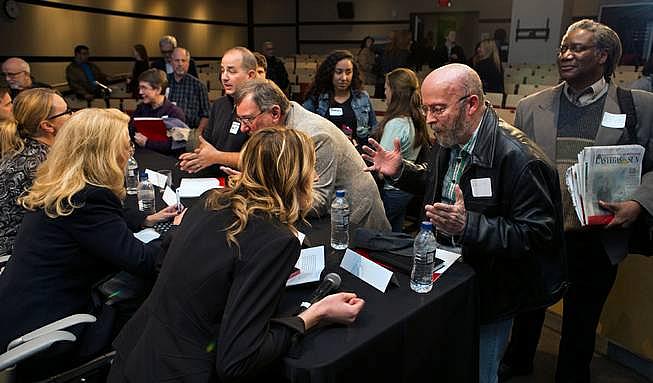In Las Vegas, parents, doctors and mental health advocates talk pediatric challenges
The Las Vegas Sun spent several months exploring community challenges created by lack of treatment for children with mental problems. Jackie Vallley reported this story for the Sun as a 2015 National Health Journalism Fellow, a program of the University of Southern California's Annenberg School for Communication and Journalism.
Other stories in the series include:
How Nevada struggles to help children battling mental illness
In Nevada, mental health crisis among children merits a closer look
‘The polio of our generation’: Mental health troubles often land kids in emergency rooms
In Las Vegas, parents, doctors and mental health advocates talk pediatric challenges

L.E. BASKOW Attendees speak to panel members following a community forum to discuss children’s mental health from Greenspun Hall at UNLV on Wednesday, December 2, 2015.
By Scott Lucas and Jackie Valley
Southern Nevada struggles to care for its children with mental health challenges — but in many ways the region is improving. That was the takeaway from a panel discussion at UNLV on Wednesday as part of the Sun’s ongoing series examining pediatric mental health.
“This is an area in our state that needs change,” said Helen Melendez, whose daughter killed herself at age 15. “You only hear about it when it’s too late.”
Melendez was joined by a group of doctors, parents and mental health advocates who discussed the challenges and successes in treating pediatric mental health in Southern Nevada.
The speakers acknowledged that, in many ways, schools, hospitals and service providers failed to do enough to care for vulnerable children. Jackie Harris, a therapist and the chairwoman of the Statewide Children’s Mental Health Consortium, put it starkly: “We do need to do better for our children and families.”
Several panelists had a personal stake in the issue. Karen Taycher, executive director of Nevada PEP, a statewide nonprofit for children with special needs, said she “became involved when my son was born with several special needs. I got a lot of blame and shame — and I had a child with medical disabilities.” Her experience led her to help form Nevada PEP, which supports families that struggle with mental health challenges.
A common complaint was that Las Vegas’ mental health care system is too fragmented to care for its children successfully. Charlene Frost, a staffer with Nevada PEP and the parent of two children with mental and behavioral health needs, said, “As parents, we are often faced with unfriendly systems.”
Frost, whose son was diagnosed with autism at 13 added, “I didn’t need blame. I needed help.”
Dr. LaTricia Coffey, a child and adolescent psychiatrist, pointed to a lack of health care providers. “There are not enough collaborative, qualified people” who care for children with mental health challenges, she said. She also pointed to fragmentation in the state’s health care system. “Everyone is on their own island.”
Dr. Jay Fisher, who directs the pediatric emergency department at the Children’s Hospital of Nevada, agreed. “Emergency departments aren’t well designed to provide these integrated and complex services. Part of the problem is that when patients get to me, the system has already failed,” he said.
They also noted cultural challenges in child-rearing in the shadow of the Strip.
Harris, a Las Vegas native, said that “raising a child here is a challenge,” including odd and overlapping work schedules for parents that can make supervision and communication harder. “I’m not saying it wouldn’t happen in other communities, but ours is unique.”
Coffey, who moved here several years ago, agreed. “We don’t have more difficulties with our children statistically, but our problems are dramatic. I haven’t seen lots of kids with eating disorders here, but I have seen a lot of kids who are taking heroin.” She added that cultural factors made it difficult to recruit mental health specialists to work in Las Vegas. “I’m uncomfortable to recruit physicians to come to Las Vegas,” she said, “because it’s almost dishonest to tell people that they will be enjoying a professional, academic and social environment.”
Panelists discussed a number of statewide and local efforts designed to improve the problem, including new programs at UNLV.
[This story was originally published by The Las Vegas Sun.]
Photographs by L.E. Baskow/The Las Vegas Sun.

